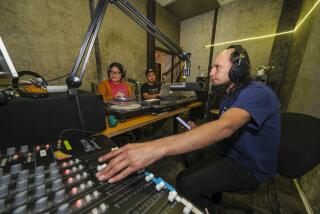Cloud of Terror Hangs Over Cubans Seeking Rights
- Share via
Cuba finds itself in a grave crisis.
In the last few years, thousands of its citizens have participated in what’s known as the Varela Project, overcoming a culture of fear and calling for a national referendum on civil rights, the peaceful evolution of freedom and reconciliation. But now a cloud of terror hangs over that quest for change.
Since March 18, Cuban state security has detained dozens of human rights activists, independent journalists and opposition leaders. Nearly 80 people have been locked away after summary trials, accused of collusion with the U.S. government. Their families have been terrorized and their homes ransacked -- without turning up the evidence of weapons or violent plots that the government claimed it would find.
The crackdown is an act against civil society, against fundamental rights and against the Varela Project. Among those detained are almost the entire executive leadership of the Christian Liberation Movement, which gave birth to the project. More than half of the detainees are project coordinators.
Through the project, named for crusading priest Father Felix Varela, 11,020 citizens petitioned the National Assembly in May 2002 requesting a referendum to guarantee Cuban civil liberties: freedom of expression and association, the right to own a private business (foreigners can own businesses in Cuba but nationals cannot), the release of nonviolent political prisoners and the right to directly elect representatives in free elections (the current system allows only for the endorsement of candidates selected by the government’s committees).
The project’s road map toward these goals follows the country’s legal code. Article 88g of the Cuban constitution allows citizens, supported by petitions signed by at least 10,000 voters, to propose legislation. And, although it’s fraught with contradictions, the constitution also includes articles protecting the rights the Varela Project promotes.
Since the project’s earliest days, the Cuban government has responded by unleashing a campaign of intimidation, confiscating signed petitions and encouraging violence and vandalism against the families and property of signature collectors. Agents have visited the homes of thousands of Varela petition signers. Some have been subpoenaed to appear at state security offices, some have lost their jobs or been expelled from universities, some have been blacklisted. Campaigns attacking the project and its leaders unfolded in Cuba. Also, a vocal and powerful minority within the Miami exile community took to the airwaves unleashing verbal attacks against the project and its leaders. They shared many of the same ideas, voiced with strikingly similar pejorative words and phrases.
And the response to the 11,000 signatures? Through the Communist Party, citizens were ordered to the streets to participate in massive marches against the project’s goals, though the project was never named. The government also began its own petition initiative using well-oiled methods of deception and intimidation; it claims to have gathered 8 million signatures for a constitutional amendment that makes the present one-party system “irrevocable.”
Still, the amendment didn’t nullify Article 88g, and the Varela Project survives.
In 2002, shortly before the signatures went to the National Assembly, former President Jimmy Carter visited Cuba. He praised the project in a nationally televised speech, introducing it to millions who had never before heard of it. More names were added to the project’s lists. Parallel efforts for change on the part of journalists, human rights activists, priests, nuns and others gained momentum. Never before had so many citizens organized from within Cuba to claim their rights.
And then came the latest crackdown.
Yet the government’s actions only promote confrontation as a means of resolution. We are determined to continue the Varela Project until the changes Cubans need are realized. Cuban citizens must be permitted to exercise their constitutional rights.
Support from nations, churches and human rights organizations around the world is vital to our success. This is the time to put pressure on the Cuban government. This is the time to insist on the release of all political prisoners and detainees. This is the time for solidarity with the Cuban people and their quest for change.
Oswaldo Paya is the national coordinator of the Citizens Committee for the promotion of the Varela Project in Cuba and an activist in the Christian Liberation Movement. In December, he was awarded the Sakharov Prize for Freedom of Thought by the European Parliament.
More to Read
Sign up for Essential California
The most important California stories and recommendations in your inbox every morning.
You may occasionally receive promotional content from the Los Angeles Times.










